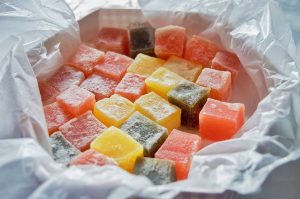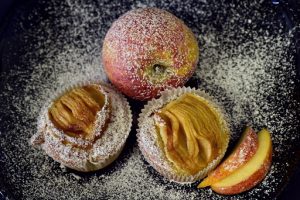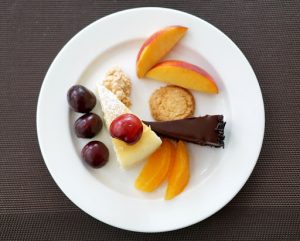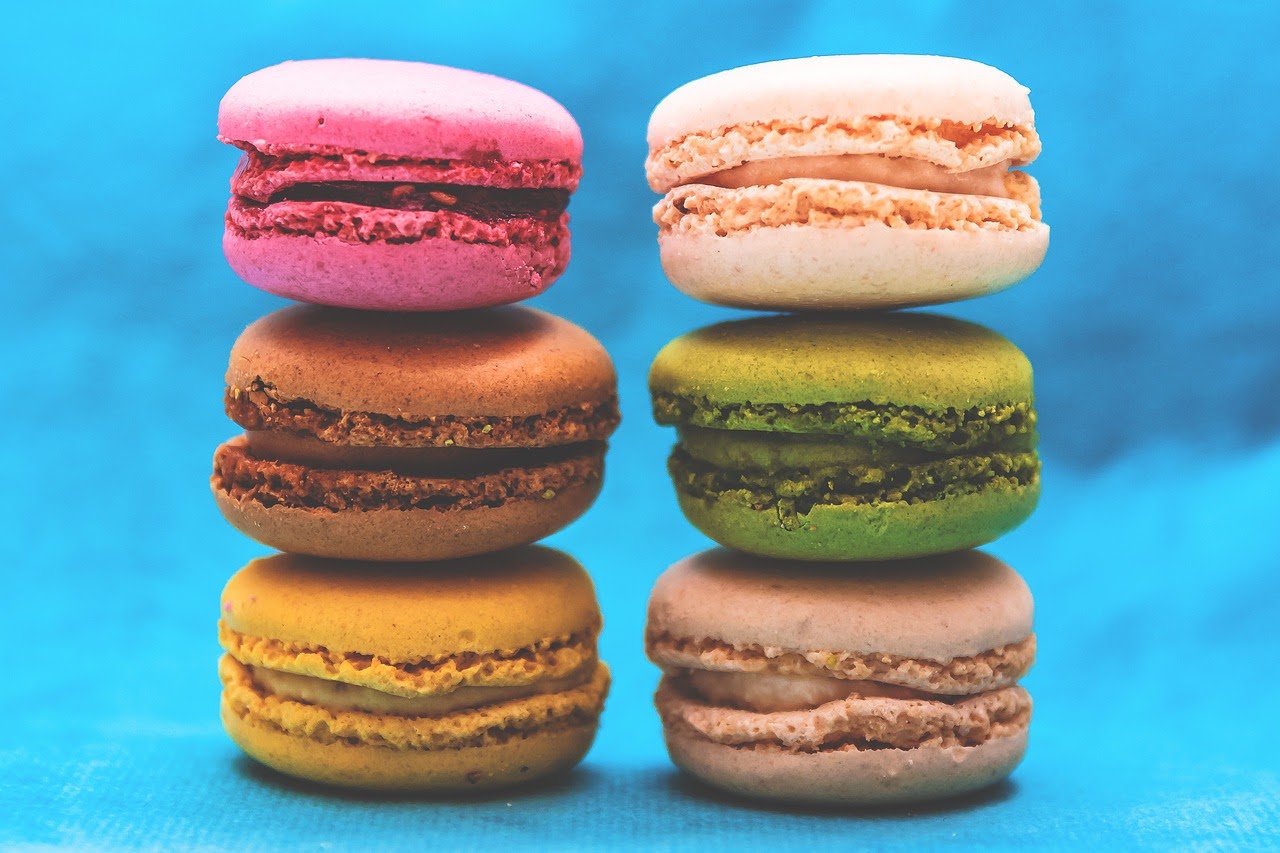Sweets and desserts don’t always enjoy a good rap in the health and fitness world. But they are also pretty hard to resist sometimes. So can you eat sweets on a plant-based diet?

It’s no secret, sweets are usually loaded with calories and contain high amounts of sugar. Most people wonder if such a combination would work in a healthy diet. These are generally right up there with all the junk food we’re always told to avoid.
Take a second to imagine your life without sweets. It would not be so sweet after all, so there has to be some room for desserts. The good news is it’s very much possible to enjoy sweets without ruining your health.
When you’re on a plant-based diet, your focus is on whole foods, whole grains, and fibers. That should also be your strategy when choosing sweets. After all, not everything that tastes sweet is bad for you.
What are Sweets?
The Webster dictionary defines sweets as something that tastes sweet like food with high sugar content. By that definition, a lot of food items could be considered sweets. However, generally, we consider candy, pastries, cakes, desserts, chocolates, and cookies as sweets.
Since all this stuff essentially has sugar and shares a similar taste profile, they can be categorized as sweets. Some of these desserts are highly processed, too, such as candies or cookies.
Calories in Sweets
It’s no surprise that sweets are usually packed with calories. The obvious contributing factor is sugar itself. In addition, many desserts are rich in carbs.

This is where things get bad, as the more sweets you eat, the more calories you consume. Oftentimes, it’s simply because of cravings for something sweet. That can make it hard for people to control what they are eating.
In a publication in the Journal of Nutrition, a whopping 97% of women reported craving sugary stuff, while the percentage for men was 68%. It’s easy to see why we fall prey to our unwanted cravings and end up in a caloric surplus.
Sweets Calorie Chart
Here’s a chart showing the calories and nutrient breakdown of some of the most popular sweets in America (as per USDA FoodCentral database):
| Chocolate Chip Cookies (1 large cookie/45 grams) | Cheesecake (1 piece or 128 grams) | Reese’s Peanut Butter Cup (1 Individual Cup/ 17 grams) | |
| Calories (kcal) | 221 | 411 | 87.6 |
| Carbohydrates (grams) | 29.4 | 32.6 | 9.4 |
| Fiber (grams) | 0.9 | 0.5 | 0.6 |
| Protein (grams) | 2.3 | 7.0 | 1.7 |
| Fat (grams) | 11.1 | 28.8 | 5.1 |
| Sugars (grams) | 14.8 | 27.9 | 14.8 |
This chart shows that three things dominate sweets: carbs, fats, and sugars. Most of the traditional desserts we eat have little to no fiber. The calories vary by each sweet, but for the most part, are quite a lot.
Is Eating Sweets Bad For You?
You can find sugar even in savory things. There’s sugar in sauces, bread, and most of the snacks. However, sweets are all about sugars.
When we talk about eating sweets, we have to take into account the health risks associated with eating too much sugar. In other words, eating sweets is not bad for you, eating too many sweets is bad for you.
There have been countless studies that have proven overconsumption of sweets to be a big red flag for your health. It’s actually a leading cause of many life-threatening diseases.
Why are unhealthy sweets bad for you?
Sweets and Weight Gain
The number one side-effect of eating too many sweet things is weight gain. Obesity, which has been a serious problem in America and many other countries, is primarily caused by overeating. With so many empty calories in added sugars, overeating sweets can result in weight gain.
A study found that fructose increases hunger and appetite, causing us to consume even more food. The main reason behind this is fructose is resistant to leptin, a hormone that indicates satiety. As you know, fructose is common in sugars used in desserts.
Risk of Type II Diabetes
According to a CDC Diabetes Statistics Report, 34.2 million (10.5%) of Americans had diabetes in 2018. Most of these cases are type II diabetes, which can result in life-threatening complications. The main culprit often is obesity, which in part, is correlated to high sugar consumption.
Another reason why those who eat a lot of sweets are more prone to diabetes is insulin resistance. Prolong overconsumption of sugars results in insulin resistance, which is the main hormone regulating blood sugar. Even a study from the International Journal of Medical Sciences found that obesity is the main contributor to diabetes.
Risk of Heart Diseases
High sugar consumption can cause obesity, inflammation, high blood pressure, and high blood sugar levels. All these side-effects can lead to cardiovascular diseases. One study directly linked sugars and saturated fats to coronary diseases.
Many studies focus on sugary drinks, but one can infer that high-sugar desserts can cause this problem too. Obesity is at the heart of it all, as it’s a major contributor to many diseases, including heart diseases.
Skin Aging
A bad diet can create havoc for your skin. Too many sugars can cause acne and wrinkles, as it ages your skin. The culprit behind this is Advanced Glycation End Products (AGEs).
AGEs are produced when the sugar from carbs-rich foods and sweets reacts with the protein in the body. These compounds damage collagen and elastin, two very important proteins for skin. As a result, sugars can cause premature aging of the skin.
Cavities
You’ve probably heard this already multiple times when you visited the dentist that candies cause cavities. They are not wrong, as sugar can have a negative impact on your dental health. Sugars from candies and other sweets can cause cavities.
The bacteria in our mouth feed on sugars. Therefore, the more sugars you put, the more it grows. Also, too much sugar, especially from drinks, can also damage the enamel.
How to Make Sweets Healthy?
No, you don’t have to run away from sweets because of all the health risks. Remember, these risks are mainly associated with overconsumption of sugar and unhealthy desserts. You can eat sweets in your plant-based diet without causing major harm to your body.

Here are some tips to make desserts healthy:
Eat in Moderation
First of all, moderation is the key to every problematic food. Believe it or not, too much of even the healthiest foods is a hazard. Keeping calories in check is all the more important when eating sweets.
If you’re consuming 2000 calories a day, it’s perfectly fine to make 100 to 200 calories out to sweets. Whatever you eat, make sure to keep the portions small. Moreover, reduce the frequency with which you eat desserts every week.
Go Natural
The main reason why sweets get a bad rap and cause so many problems is that often they are heavily processed. You can avoid that pitfall by simply eating natural sweets.
If you find small portions of desserts don’t satisfy enough, you can even go big with natural sweets. This includes fresh fruits, frozen fruits, trail mix, rice cakes, etc.
Change Recipes
When making desserts at home, take a step back, and evaluate which ingredients could use a change. For instance, a lot of the desserts use table sugar. Why not go for a healthy alternative like honey or stevia?
You can always add your own twist to make things more healthy. Try adding whole foods to your recipes and increasing the fiber content. That usually does the job of making food healthier.
Healthy Dessert Ideas
If you often crave sweet things but fear they will ruin your plant-based diet, you can opt for some healthy alternatives. These are sweet, so you’ll get to satisfy your cravings. More importantly, these desserts will keep you not deviate you from your fitness goals.
Here are some healthy desserts and sweets you can eat on a plant-based diet:
Fresh Fruits
Fresh fruits are naturally sweet, so you can treat them as dessert. They do contain sugars, but those are natural sugars that don’t cause any harm. Also, fruits are rich in vitamins, minerals, and fiber.
One fruit for dessert that’s healthy and nutritious on its own is strawberry. You can eat them just like that or cover with dark chocolate. Fresh strawberries also go as topping on so many other desserts.
If you get bored of eating whole fruits as sweets, you can try incorporating some fruits into healthy desserts.
Healthy Desserts with Apples
Apples are available year-round and come in so many varieties. They are incredibly rich in Vitamin C and Vitamin K. Also, they are good weight loss, as they are usually quite filling.

Here are some healthy dessert ideas that use apples:
- Baked Apples
- Apple Muffins
- Apple Pie Oatmeal Cookies
- Low-fat Apple Cake
- Swedish Apple Pie
Is Apple Keto? Fruits don’t fit well in a keto diet, given their high carb content. So, apples would not qualify as keto-friendly.
Is Apple Gluten-free? Yes, apples are gluten-free. However, not all apple desserts might be gluten-free. Swedish apple pie is both gluten-free and dairy-free.
Healthy Desserts with Bananas
Bananas are dirt cheap, so you can use bananas when making desserts for a large party. These are rich in Potassium, which is great for your heart. Also, the Magnesium in bananas is good for the skin.

Just like strawberries, you can also enjoy bananas dipped in chocolate. Use dark chocolate as it has fewer calories than regular chocolate or milk chocolate. Plus, it balances the sweetness of the banana very nicely.
Here are some other dessert ideas using bananas:
- Banana Walnut Bread
- Vegan Banana Creme Brûlée
- Banana Pancakes
- Banana Chips
- Roasted Bananas with Coconut Cream
Is Banana Keto? Bananas contain 25 grams of carbs per 100 grams. Therefore, you should not eat them while on a keto diet.
Is Banana Gluten-free? The banana itself, and some banana desserts are gluten-free. Try replacing flour or whole-wheat flour in banana desserts with some gluten-free alternatives.
Healthy Desserts to Bake
Baking is mostly at the heart of making desserts. Cakes, bread, cookies, muffins, brownies, all come out of the oven. If you love baking, you can try eating these healthy plant-based diet sweets and baked dessert ideas:
- Oatmeal Cookies
- Baked Peaches
- Gluten-Free Chocolate Chip Cookies
- Peanut Butter Muffins
- Peanut Butter Rice Krispie Treats
- Cranberry Pound Cake
Healthy Desserts No Bake
For those who don’t want to go through the hassle of baking or don’t own an oven, no-bake desserts are the solution. These desserts are perhaps even healthier as they don’t use any oil or butter at all. Also, some of them just take less than 30 minutes to prepare.

Source: https://pixabay.com/photos/dessert-fruit-cake-plate-cherry-978665/
- Coconut Tart
- Lemon Cream Tart
- Key Lime Cheesecake
- No-Bake Apple Protein Bars
- Stuffed Dates
- Greek Yogurt with Fresh Fruits Tart
- No-Bake Chocolate Avocado Pudding
- Homemade Popsicles
Other Healthy Sweets you can eat on a Plant-based Diet
You can experiment with your favorite fruits, vegetables, and nuts to make healthy desserts. There are new and interesting recipes all over the internet. It does not always have to be with traditional dessert ingredients.
For instance, try this Purple Potato Cake with Autumn Fruits from Forks Over Knives. Purple potatoes are extremely rich in minerals and fiber. Similarly, this Pear Spice Cake brings some spicy notes to an otherwise sweet dessert with whole fruits and nuts.
Since a plant-based diet is also about saving the environment, you should make desserts out of any leftovers. Check out this Leftover Rice Pudding recipe from Plant-Strong that’s downright delicious.
Wrap Up
So, can you eat sweets on a plant-based diet? Yes, as long as you opt for healthy ingredients and keep the portions under control. There’s always a little room for something sweet, no matter what your fitness goals are.
It’s best to stick to homemade sweets or fresh desserts from bakeries and restaurants. Avoid eating store-bought desserts, as they are heavily processed. Also, they lack the punch and flavor of fresh ingredients.
Technically, sugars in desserts are plant-based, but you should not overdo it. More importantly, use natural sugars as much as possible in all your sweets.
You may also like: WHAT CAN YOU EAT ON A PLANT BASED DIET? >>CLICK HERE!










